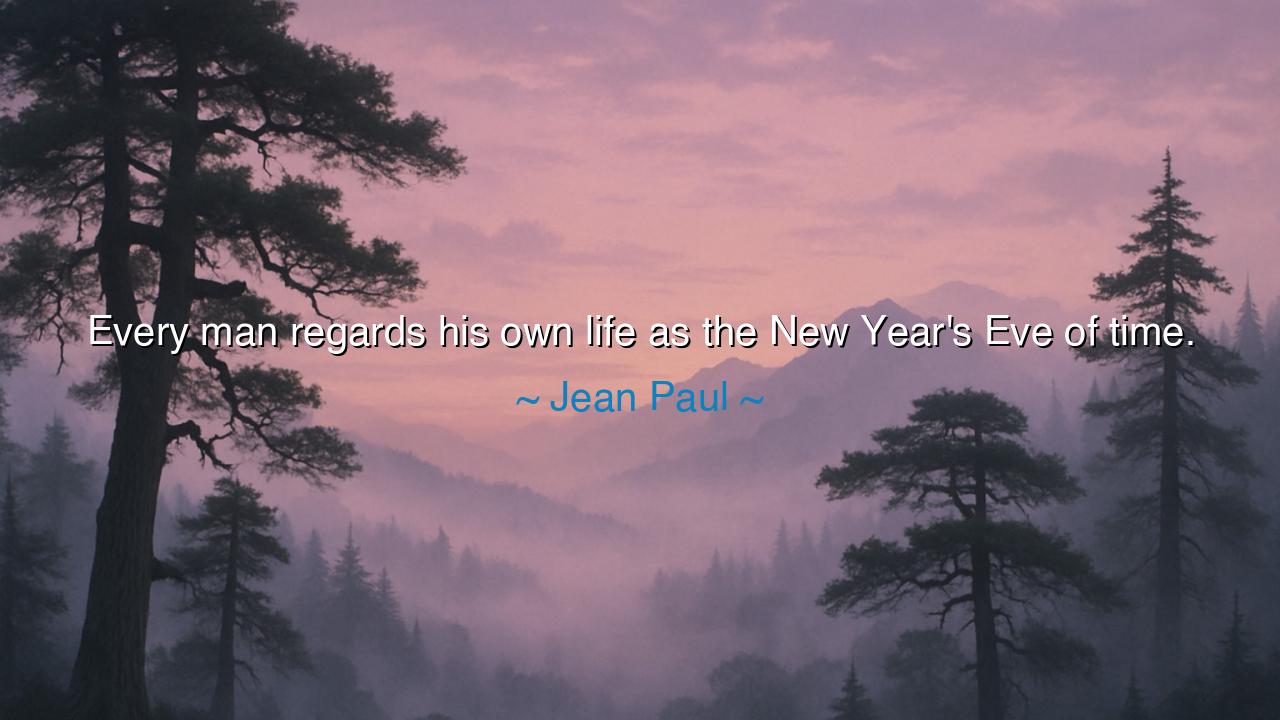
Every man regards his own life as the New Year's Eve of time.






"Every man regards his own life as the New Year's Eve of time." These words by Jean Paul speak to a universal truth about the human experience—the tendency to view our lives as fleeting, precious, and imbued with significance. Just as New Year's Eve marks the transition from one year to the next, so too does each moment of our existence represent a shifting threshold, a point of reflection on the passage of time. Jean Paul beautifully captures the essence of this human tendency: we look at our own lives with a sense of finality, a sense that we are always on the edge of something new, something transcendent, but also something ephemeral. His words remind us that our lives are not endless—they are limited, and the awareness of this brings both urgency and meaning to our journey.
In the ancient world, this awareness of time and mortality was a central theme in the lives of many great philosophers. Socrates famously claimed, “The unexamined life is not worth living,” pointing out that a life not spent in self-reflection, in understanding, is a life that slips by without meaning. He lived with the knowledge that time was limited, and that death would eventually come for him. In his mind, every day was a New Year's Eve—a day of reflection and a day to make meaningful choices. Socrates did not wait for the literal turning of a year to evaluate his life, but approached each moment with the same awareness that time is fleeting, that each day is an opportunity to grow and to live authentically.
Consider the example of Alexander the Great, who, at the young age of 32, had already conquered vast lands and forged an empire. Yet, despite his extraordinary achievements, he was keenly aware of the brevity of life. On his deathbed, Alexander is said to have wished for more time to achieve his dreams, lamenting that his life had passed too quickly. Alexander’s awareness of time—his sense of urgency—shaped the entire course of his life. His conquests were driven not only by ambition but by the understanding that life was short, and that he must act with speed and decisiveness. Like the New Year’s Eve, every moment for Alexander was a call to act—because time was slipping away.
Similarly, the life of Leonardo da Vinci reveals a similar urgency. Da Vinci, though a genius, was often frustrated by the fact that he could not accomplish everything he desired. His mind was constantly filled with new ideas, inventions, and artistic creations, but he knew, perhaps better than anyone, the limits of time. His prolific work, spanning fields from art to engineering, was driven by a profound awareness that his time on Earth was finite. He sought to capture the fleeting beauty of life through his paintings and inventions, understanding that his own life—like the turning of the year—was a countdown to an unknown end.
In the more recent context, Martin Luther King Jr., despite facing profound challenges and opposition, lived his life with a sense of urgency. He famously said, "I may not get there with you, but I want you to know tonight, that we, as a people, will get to the promised land." King understood that the time he had was limited, and he dedicated himself to the struggle for justice, fully aware that every day mattered in the fight for freedom and equality. His life was a constant movement toward the future, but it was also a call to live fully in the present, to act with purpose and determination, for the promise of tomorrow could not be taken for granted.
The lesson here, as Jean Paul imparts, is a call to recognize the preciousness of our time. Life is indeed the New Year's Eve of time—a moment filled with both reflection and anticipation. Each day is an opportunity to look back, to appreciate the growth and progress we’ve made, and to look forward, with determination, to the work still left undone. Time is not something we can control or extend indefinitely, but it is something we can embrace fully, using each moment wisely.
In practical terms, this means we must live intentionally and mindfully. Let us not wait for a literal New Year’s Eve to reflect on our lives, but let each day serve as an opportunity to reassess, to take stock of our progress, and to make meaningful choices. We must not wait until it is too late to make the changes we need—like Alexander or Leonardo, we must live with urgency and clarity, understanding that our lives are finite and that each moment counts. Let us approach our lives not with regret for what has passed, but with a deep appreciation for the present, knowing that the future will be shaped by how we live today.






AAdministratorAdministrator
Welcome, honored guests. Please leave a comment, we will respond soon